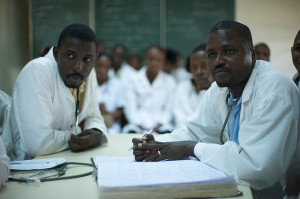“The optimist is someone who believes the future is uncertain.” Leo Szilard

When I first studied epidemiology several decades ago, a story made the rounds that was supposed to make us feel that we were smart. If an old man came into a medical clinic with diarrhoea, the doctor would treat it. If the man was followed by a child and a middle-aged woman, also with diarrhoea, they would also get proper advice and medication. After a few dozen people came through the door with similar signs, an epidemiologist might ask if these people had something in common. Was there an outbreak? If one stepped outside, might one see all these people drinking contaminated water from the pump on Broad Street? And if she called around to many clinics, and they were all having such outbreaks, was there an epidemic? Maybe all the drinking water in the city was contaminated.
The story usually stopped then, but some of us, once we got our teeth into the bone, wouldn’t let go: what if there were multiple epidemics, occurring with greater frequency year by year, what then?
In 1848, Rudolf Virchow was sent by the Prussian government to investigate the causes of a typhus epidemic in Upper Silesia. After intensive investigation, he submitted a report that recommended a programme that included full employment, higher wages, the establishment of agricultural cooperatives, universal education and the disestablishment of the Catholic church. Given their recent apparent change of heart, I might give the Catholic church a pass, but otherwise Virchow had it about right.
Emerging infectious diseases

In 1992, the Institute of Medicine (IOM) in the United States produced a report on emerging infectious diseases (EID), and identified the following causes: human demographics and behaviour; technology and industry; economic development and land use; international travel and commerce; microbial adaptation and change; breakdown of public health measures. They suggested better surveillance, vaccine and drug development, vector control (primarily through better pesticides) and behavioural changes among individuals at risk.
No mention of regulating land use, industrial development and international trade, working for more equitable economic development, mandatory health insurance or paid sick leave for all employees, education for girls, or better access to birth control.
In 2012, a review of progress since the 1992 IOM report concluded that the most important advances in 20 years in controlling EIDs were “genomics-associated advances in microbial detection and treatment, improved disease surveillance, and greater awareness of EIDs and the complicated variables that underlie emergence.”
In the meantime we’ve had Q Fever, H1N1, H5N1, globalisation of foodborne bacterial diseases, Ebola, Nipah, etc. all of which emerged not because we lacked drugs and vaccines, but because of the ways we have defined economic development and our rapacious use of resources.
Social and economic equity
Sorry if I sound a little cynical. We all want a vaccine and a drug for each disease; not because they are the best solution, but because they offer profits for shareholders (not the next generation of disease-ridden children, not those shareholders – the other ones). But with a few exceptions, vaccines work best as mop-up operations at the tail of an epidemic, and drugs are responses to failures.
The biggest health improvements in the past 200 years came from better nutrition, housing, potable water, sewage disposal, flush toilets, improved nutrition, air conditioners, chlorination, cleaner hospitals, and greater social and economic equity in social-welfare states.
In the 21st century, as we run out of available water and heat up the globe, some of the first-run solutions to our wicked problems have created new problems. That’s the nature of wicked problems. That’s what complexity means.
Unless we can integrate new, locally-based, less-energy intensive ways to produce and distribute food, more ecologically-based waste management, democratic processes, open scientific inquiry and a massive shift of expenditures from military to negotiated solutions, the diseases will just keep coming.
Social determinants of health
The two most comprehensive global research programmes on health this century have been the reports from the Intergovernmental Panel on Climate Change and the Millennium Ecosystem Assessment, neither of which had health in the title. In 2008 the WHO review of evidence related to the social determinants of health declared that, “Social injustice is killing people on a grand scale”, and recommended that governments work to “improve daily living conditions, including the circumstances in which people are born, grow, live, work and age”; and “tackle the inequitable distribution of power, money and resources – the structural drivers of those conditions – globally, nationally and locally.”
What was missing was consideration of the complex interactions among the ecological and social conditions, what and how we eat and use water, how we define waste, how we manage it, wilderness conservation, transportation, employment, meaningful lives, research and action.
Some will say that’s far too complex; we don’t have the methodologies for it. So let’s invent some.
We know how to prevent emerging infectious diseases. And in not acting, I’d say we are in the same boat as vaccine-deniers and crystal-ball wishers. We may be [expletive deleted]. But I’m an optimist. I don’t think that’s yet certain.
David Waltner-Toews is a science writer and retired academic. He is a Professor Emeritus at University of Guelph and recipient of the inaugural award for contributions to ecosystem approaches to health from The International Association for Ecology and Health.
He will be taking part in a panel on ecosystem-poverty-health interactions at the One Health for the Real World: zoonoses, ecosystems and wellbeing symposium, 17-18 March 2016, co-organised by the STEPS-led Dynamic Drivers of Disease in Africa Consortium and now registering.